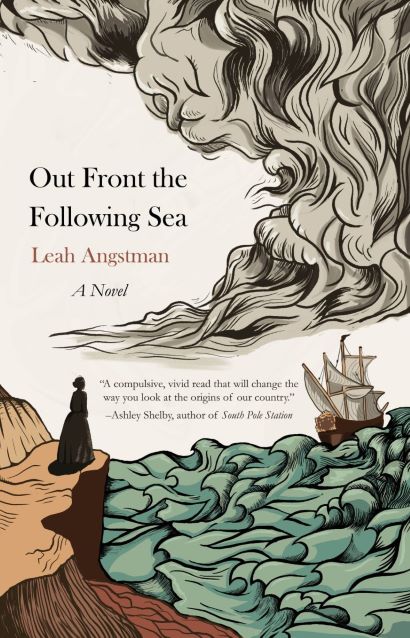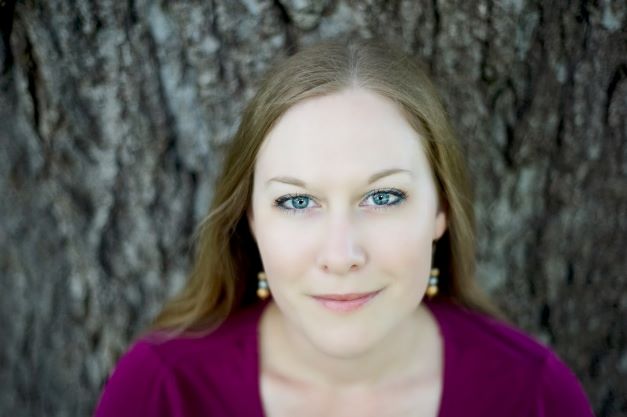Editor’s Note: This exchange is part of a series of brief interviews with emerging writers of recent or forthcoming books. If you enjoyed it, please visit other interviews in the I’ve Got Questions feature.
- What’s the title of your book? Fiction? Nonfiction? Poetry? Who is the publisher and what’s the publication date?
My book has the tongue-twister of a title Out Front the Following Sea. It’s my debut novel, being published by Regal House Publishing on January 11, 2022.
- In a couple of sentences, what’s the book about?
Only a couple sentences? Can we get a longer elevator ride? No? Then, here goes: It’s a historical epic of one headstrong Englishwoman’s struggle to survive in the brutal wilds of 17th-century New England, where she’s been branded a witch and forced to escape the only town she’s ever known. When tensions arise between English and French settlers during King William’s War, she must save her treasonous Frenchman from the noose and reckon with all the townsfolk, Pequot Indians, highwaymen, soldiers, Quakers, pirates, and witch-hunters she’s dragged into the fray.
- What’s the book’s genre (for fiction and nonfiction) or primary style (for poetry)?
My novel is a highly poetic literary historical epic, though I’ve seen it fall under categories for “adventure” and “literary thriller,” as well. It’s a lot of things in one violent, lovely package.
- What’s the nicest thing anyone has said about the book so far?
She’s been called “Stunning” and “Masterfully crafted” by Readers’ Favorite, which is pretty awesome, and I’m thrilled that half of my 5-star reviews on Goodreads start with “Wow!” That makes me pretty tickled. I loved Jason Denness’ review that said, “Angstman likes to go beyond what a lot of authors will do; some will create characters that will break your heart … with Angstman, it feels like she has reached into your chest to remove your heart and breaks it in front of you.” I’ve also had one person tell me he missed his bus stop and one person tell me she missed her Zoom meeting because my book was so engrossing—those are pretty rad compliments.
But probably Ethel Rohan’s blurb, which brings me to tears, is the one I return to: “An absorbing, painstakingly researched read that, like the sea itself, mirrors the beauty, cruelty, enormity, baseness, and wonder of human nature. It is chilling that Angstman’s debut novel set in 17th-century New England captures the horrors that continue to plague contemporary America, particularly with regard to imperialism and patriarchy. It is heart-swelling that, in these pages and in life, the best of humankind resists and endures. I’ll remember this book as a historical tale woven with wry humor, striking detail, lush prose, daring characters, and a belief in glorious possibilities.”
- What book or books is yours comparable to or a cross between? [Is your book like Moby Dick or maybe it’s more like Frankenstein meets Peter Pan?]
I don’t know any other book quite like it. It’s closest to The Witch of Blackbird Pond meets Beheld, but with the poeticism of Cormac McCarthy, the brutality of Jack London, the epic detail of James Clavell’s Tai-Pan, the purple prose of Melville, the seafaring journey of the Master and Commander series, and the action-adventure of Bernard Cornwell. Reviews have compared it to Lalita Tademy, Sara Donati, and Delia Owens.
- Why this book? Why now?
The 1600s in America fascinates me to no end, and one of its most fascinating features is how much it mirrors today. Despite colonists pooping in chamber pots, dying from relatively mundane disorders, and not knowing any world outside their mile-wide bubble, misogyny and the patriarchy were fierce; and women, Native Americans, and enslaved people had to fight for every scrap they got. Flash forward to 2022, and we’re still fighting imperialism, racism, and misogyny, and refusing to learn a lot of lessons we should have paid attention to.
Why now? Because now, as much as ever, we need to see how history treated women and how they rose above it. In the era of #MeToo and #BelieveWomen and #TimesUp, we need to read story after story after story of how women have persevered through the patriarchy for centuries despite the odds. And we need to stop romanticizing history—it’s ugly, it has harsh truths, it’s all kinds of gray shades, it holds no heroes. The strength of my story is in its controversies, in how uncomfortable it will make you, in how it forces you to face the terrifying time that was the 1600s without allowing you the solace of rose-colored glasses. And yet, if you’re a close reader, you’ll see the flickers of hope that get us through our everyday lives and always have—the flickers of hope we need so desperately right now, as we venture very dangerously into a failing future.
- Other than writing this book, what’s the best job you’ve ever had?
I’ve never had a job I loved (and if we’re being honest here, I don’t even love writing, to quote Dorothy Parker: “I hate writing; I love having written”), though I’ve had some interesting ones. The “best” in terms of money was bartending in Boston on a Friday night. I suppose the most rewarding is running Alternating Current Press, though there’s little thanks in it, and moneywise, it barely breaks even. And I liked the prestige of being Arts & Entertainment Editor and Managing Editor of my local newspapers back in the day—though it was a lot of late nights and tediously tiny print in a time when newspaper type was still all laid out by hand.
- What do you want readers to take away from the book?
I’d love for them to walk away having new notions about the 17th-century, that it’s not some stodgy old “simpler times” story that wholesome people want to feed you. It was dangerous and difficult and a special kind of feat to stay alive. I want readers to lose their preconceived notions of the time period and become immersed in something thrilling and uncertain. I want readers to know it’s okay to take the journey, to have your heart broken, to confront the ugliness even if it makes you uncomfortable, and I want them to remain stuck in this world that they didn’t expect, long after they’ve closed the covers. I want readers to discover the overlooked and underappreciated 1600s for the first time, and get bit by the research bug to go searching for more discoveries.
- What food and/or music do you associate with the book?
If you ask me, I get all the feels from some good Zeal & Ardor dark-gospel rock, but in reality, it would’ve been stringy baroque music, Anglo church hymns, grog, buttered rum, port wine, aqua vitae, and boiled everything. Blargh.
- What book(s) are you reading currently?
For research, I’m reading The British Are Coming: The War for America, Lexington to Princeton, 1775-1777 by Rick Atkinson for a novella about the skirmish of Lexington I’m polishing, and Suzanne M. Desan’s Living the French Revolution and the Age of Napoleon for my War of 1812 trilogy that I recently started writing. For fun, I’m loving Jennifer Fliss’ The Predatory Animal Ball and crying over Shaindel Beers’ Secure Your Own Mask.
Learn more about Leah at her website.
Follow her on Amazon, Facebook, Twitter, and Instagram.
Buy the book from the publisher (Regal House Publishing), Amazon, or Bookshop.org.


